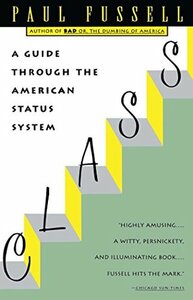You need to sign in or sign up before continuing.
Take a photo of a barcode or cover
challenging
funny
informative
lighthearted
reflective
slow-paced
I found the book a bit hard to read because of the language and time difference. It still made me giggle particularly about middle class.
funny
informative
reflective
medium-paced
funny
lighthearted
reflective
fast-paced
Horrible design made book seem much denser than it needed to be. Just enough witty quips to keep one interested, and scary how little has actually changed in 30-some years.
funny
informative
lighthearted
medium-paced
Brilliant deconstruction of class structure in late 20th-Century America. It was dated 20 years ago, but remains a favorite. Biting, hilarious truth.
Fussel, or Captain Cranky Pants, takes a fiercly honest look at the US social caste system, including the 'uppers', the 'middles', and the 'proles'. He concludes by offering a template for escaping the prison of social class.
I thought this book a hoot! It is forty years old and I laughed throughout. I lived through most of his analogies and I can't relate to those who call it dated. Americans are completely obsessed with esteem, status and class, whether they are self-aware or not. How else can anyone explain Ralph Lauren?
I admit I was put off initially by his forthright distinctions of Upper-class, Middle class and Proles. I kept reading and allowed my initial aversion to be calmed. Fussell is not making judgements as much as he is presenting motivation and cause of why Americans find it necessary to judge and place themselves in a class. None of the class descriptions made me think one was more preferable than the other. I read this as a sociological progression of a country born of a Colonizing, world power that has faded over time, but a country parented by many other cultural traditions that offer opportunities to evolve beyond the Anglophilic glorification of previous generations.
The best chapter is the Chapter VII on language. Being an English professor at the University of Pennsylvania it is no wonder this would carry some weight. Language is constantly evolving with the culture. However we use language, the why-we-said-it-that-way must be considered. The previous chapter on American educational institutions and the cultural background of many of those institutions declare Fussers opinion of the "educated classes." Human nature being what it is, he writes ""But intelligence and learning and curiosity are, regrettably, rarer than some imagine, and you don't bring people into contact with them simply by announcing that you're doing it."
Class is what you make of it.
I admit I was put off initially by his forthright distinctions of Upper-class, Middle class and Proles. I kept reading and allowed my initial aversion to be calmed. Fussell is not making judgements as much as he is presenting motivation and cause of why Americans find it necessary to judge and place themselves in a class. None of the class descriptions made me think one was more preferable than the other. I read this as a sociological progression of a country born of a Colonizing, world power that has faded over time, but a country parented by many other cultural traditions that offer opportunities to evolve beyond the Anglophilic glorification of previous generations.
The best chapter is the Chapter VII on language. Being an English professor at the University of Pennsylvania it is no wonder this would carry some weight. Language is constantly evolving with the culture. However we use language, the why-we-said-it-that-way must be considered. The previous chapter on American educational institutions and the cultural background of many of those institutions declare Fussers opinion of the "educated classes." Human nature being what it is, he writes ""But intelligence and learning and curiosity are, regrettably, rarer than some imagine, and you don't bring people into contact with them simply by announcing that you're doing it."
Class is what you make of it.
. very little conceptualization and or assimilation of evidence based practices, in my opinion. Found it to be humorous and full of "generalizations" contrasted to intellectual appeasing.


